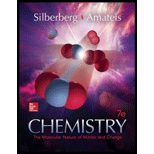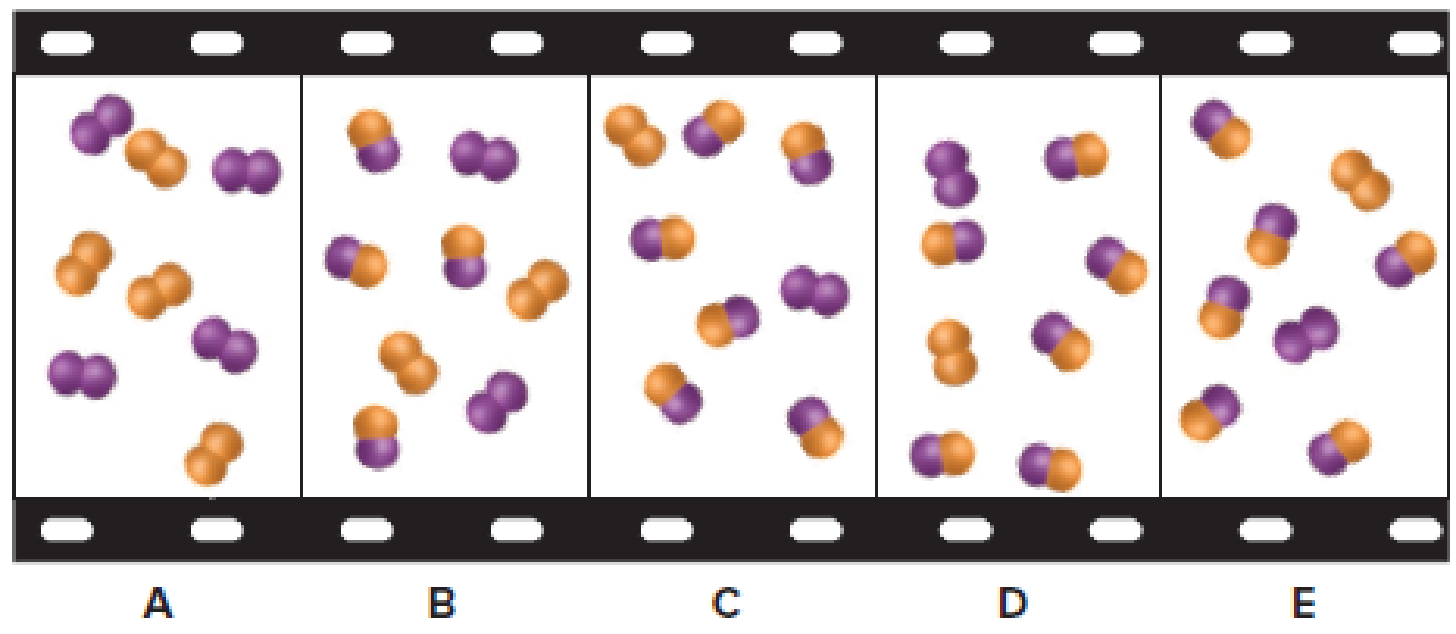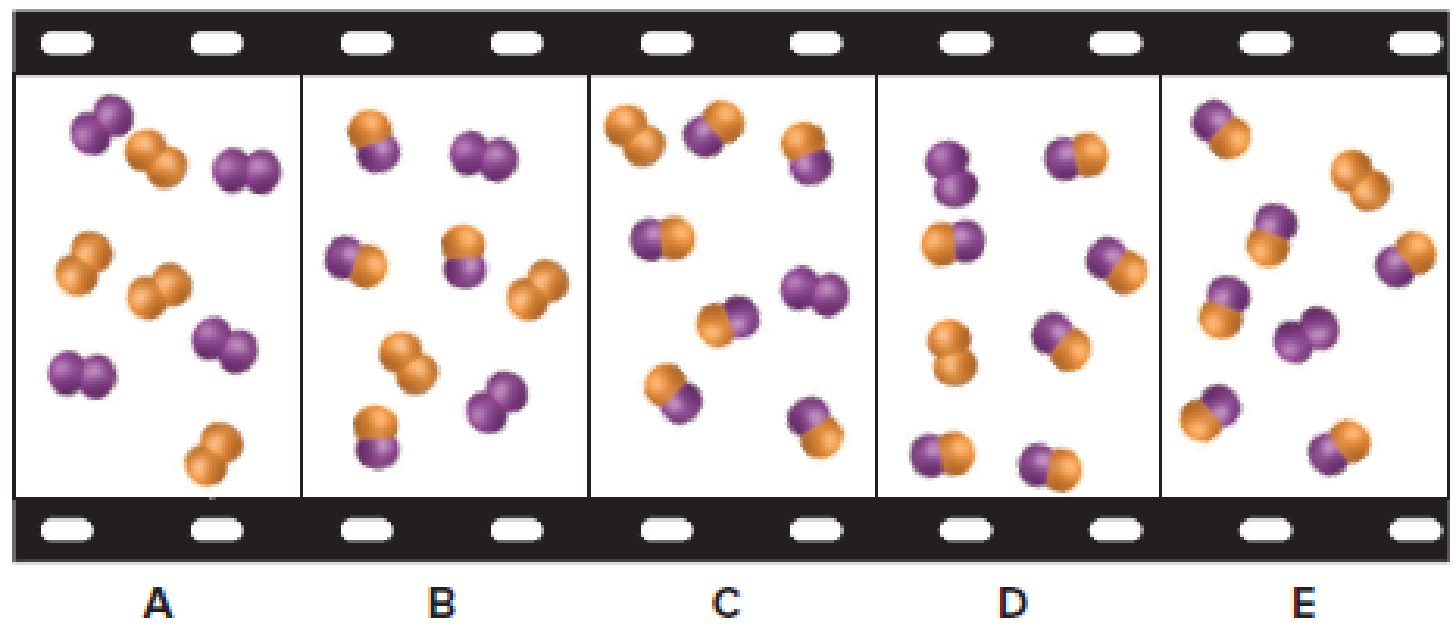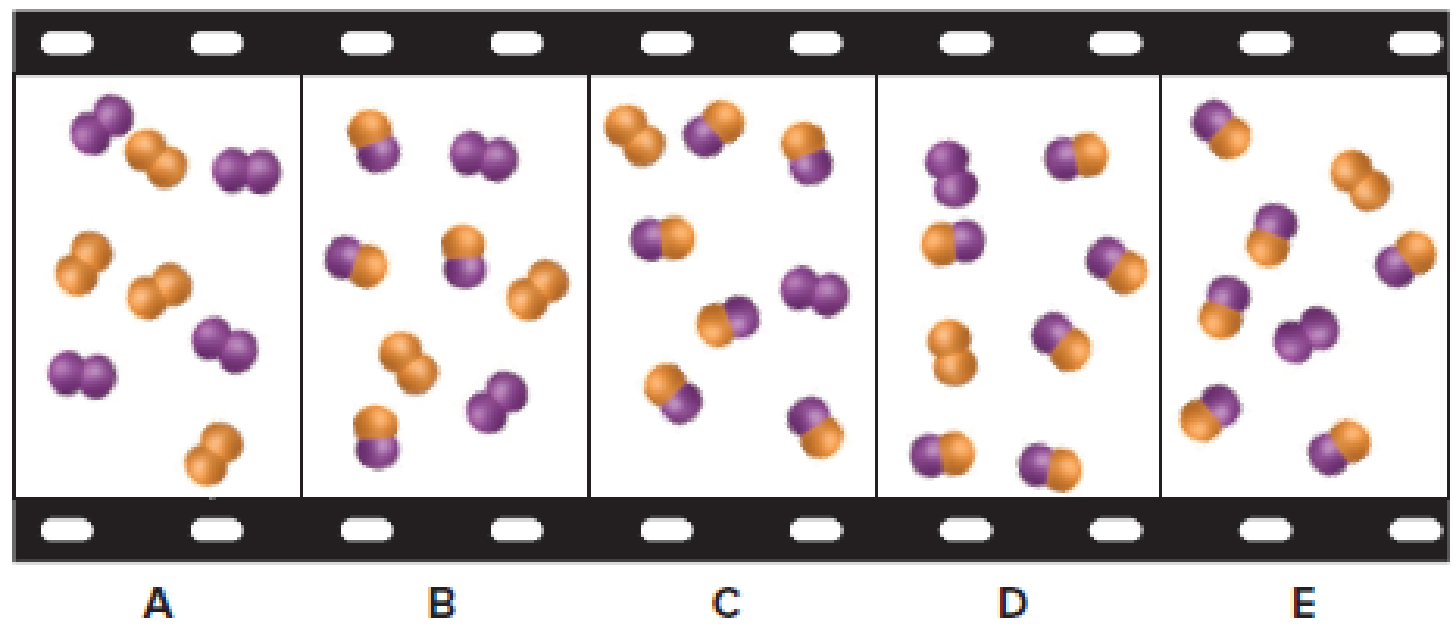
(a)
Interpretation:
The given reaction is
The reaction quotient,
Concept Introduction:
Reaction quotient:
The ratio of concentration terms for a reaction is known as reaction quotient. It is denoted by
(a)
Explanation of Solution
The given reaction is
The reaction quotient for the reaction can be represented as
(b)
Interpretation:
The given filmstrip contains five molecular scenes of a gaseous mixture as it reaches equilibrium over time. In the filmstrip,

Figure 1
If each particle represents
Concept Introduction:
Reaction quotient:
The ratio of concentration terms for a reaction is known as reaction quotient. It is denoted by
(b)
Explanation of Solution
Scene A:
The
Scene B:
The
Scene C, D, E:
The
(c)
Interpretation:
The given reaction is
If
Concept Introduction:
At equilibrium,
If
If
If
(c)
Explanation of Solution
The given condition is
Scene-A:
The value of
Scene-B:
The value of
Scene-C, D, E:
The value of
As the value of
(d)
Interpretation:
The given reaction is
The value of
Concept Introduction:
Reaction quotient:
The ratio of concentration terms for a reaction is known as reaction quotient. It is denoted by
At equilibrium,
(d)
Explanation of Solution
As
(e)
Interpretation:
The given filmstrip contains five molecular scenes of a gaseous mixture as it reaches equilibrium over time. In the filmstrip,

Figure 1
If
Concept Introduction:
Change in equilibrium due to temperature changes:
If the temperature is increased for the system, the equilibrium shifts away from the heat because of the reaction needs extra heat to use.
If the temperature is decreased for the system, the equilibrium shifts towards the heat because the heat needs to be produced to make up for the loss.
(e)
Explanation of Solution
Among the given five scenes, the scene that represents the mixture at a higher temperature is scene B. At higher temperatures, reaction shifts towards left forming more
(f)
Interpretation:
The given filmstrip contains five molecular scenes of a gaseous mixture as it reaches equilibrium over time. In the filmstrip,

Figure 1
The scene that represents the mixture at a higher pressure (lower volume) has to be explained.
Concept Introduction:
Change in equilibrium due to pressure changes:
On increase in the system pressure, the equilibrium shifts towards fewer moles of gas, because, for gases,
On decrease in the system pressure, the equilibrium shifts towards more moles of gas, because, for gases,
(f)
Explanation of Solution
The given reaction is
The gaseous molecules in reactants are
Want to see more full solutions like this?
Chapter 17 Solutions
Chemistry: The Molecular Nature of Matter and Change - Standalone book
- For Raman spectroscopy/imaging, which statement is not true regarding its disadvantages? a) Limited spatial resolution. b) Short integration time. c) A one-dimensional technique. d) Weak signal, only 1 in 108 incident photons is Raman scattered. e) Fluorescence interference.arrow_forwardUsing a cell of known pathlength b = 1.25115 x 10-3 cm, a water absorption spectrum was measured. The band at 1645 cm-1, assigned to the O-H bending, showed an absorbance, A, of 1.40. a) Assuming that water density is 1.00 g/mL, calculate the water molar concentration c (hint: M= mole/L) b) Calculate the molar absorptivity, a, of the 1645 cm-1 band c) The transmitted light, I, can be written as I= Ioexp(-xb), where x is the absorption coefficient (sometimes designated as alpha), Io is the input light, and b is the cell pathlength. Prove that x= (ln10)*x*c. (Please provide a full derivation of the equation for x from the equation for I). d) Calculate x for the 1645 cm-1 bandarrow_forwardI need help with the follloaingarrow_forward
- For a CARS experiment on a Raman band 918 cm-1, if omega1= 1280 nm, calculate the omega2 in wavelength (nm) and the CARS output in wavelength (nm).arrow_forwardI need help with the following questionarrow_forwardFor CARS, which statement is not true regarding its advantages? a) Contrast signal based on vibrational characteristics, no need for fluorescent tagging. b) Stronger signals than spontaneous Raman. c) Suffers from fluorescence interference, because CARS signal is at high frequency. d) Faster, more efficient imaging for real-time analysis. e) Higher resolution than spontaneous Raman microscopy.arrow_forward
- Draw the major product of the Claisen condensation reaction between two molecules of this ester. Ignore inorganic byproducts. Incorrect, 5 attempts remaining 1. NaOCH3/CH3OH 2. Acidic workup Select to Draw O Incorrect, 5 attempts remaining The total number of carbons in the parent chain is incorrect. Review the reaction conditions including starting materials and/or intermediate structures and recount the number of carbon atoms in the parent chain of your structure. OKarrow_forwardUsing a cell of known pathlength b = 1.25115 x 10-3 cm, a water absorption spectrum was measured. The band at 1645 cm-1, assigned to the O-H bending, showed an absorbance, A, of 1.40. a) Assuming that water density is 1.00 g/mL, calculate the water molar concentration c (hint: M= mole/L) b) Calculate the molar absorptivity, a, of the 1645 cm-1 band c) The transmitted light, I, can be written as I= Ioexp(-xb), where x is the absorption coefficient (sometimes designated as alpha), Io is the input light, and b is the cell pathlength. Prove that x= (ln10)*x*c d) Calculate x for the 1645 cm-1 bandarrow_forwardConvert 1.38 eV into wavelength (nm) and wavenumber (cm-1) (c = 2.998 x 108 m/s; h = 6.626 x 10-34 J*s).arrow_forward
 ChemistryChemistryISBN:9781305957404Author:Steven S. Zumdahl, Susan A. Zumdahl, Donald J. DeCostePublisher:Cengage Learning
ChemistryChemistryISBN:9781305957404Author:Steven S. Zumdahl, Susan A. Zumdahl, Donald J. DeCostePublisher:Cengage Learning ChemistryChemistryISBN:9781259911156Author:Raymond Chang Dr., Jason Overby ProfessorPublisher:McGraw-Hill Education
ChemistryChemistryISBN:9781259911156Author:Raymond Chang Dr., Jason Overby ProfessorPublisher:McGraw-Hill Education Principles of Instrumental AnalysisChemistryISBN:9781305577213Author:Douglas A. Skoog, F. James Holler, Stanley R. CrouchPublisher:Cengage Learning
Principles of Instrumental AnalysisChemistryISBN:9781305577213Author:Douglas A. Skoog, F. James Holler, Stanley R. CrouchPublisher:Cengage Learning Organic ChemistryChemistryISBN:9780078021558Author:Janice Gorzynski Smith Dr.Publisher:McGraw-Hill Education
Organic ChemistryChemistryISBN:9780078021558Author:Janice Gorzynski Smith Dr.Publisher:McGraw-Hill Education Chemistry: Principles and ReactionsChemistryISBN:9781305079373Author:William L. Masterton, Cecile N. HurleyPublisher:Cengage Learning
Chemistry: Principles and ReactionsChemistryISBN:9781305079373Author:William L. Masterton, Cecile N. HurleyPublisher:Cengage Learning Elementary Principles of Chemical Processes, Bind...ChemistryISBN:9781118431221Author:Richard M. Felder, Ronald W. Rousseau, Lisa G. BullardPublisher:WILEY
Elementary Principles of Chemical Processes, Bind...ChemistryISBN:9781118431221Author:Richard M. Felder, Ronald W. Rousseau, Lisa G. BullardPublisher:WILEY





